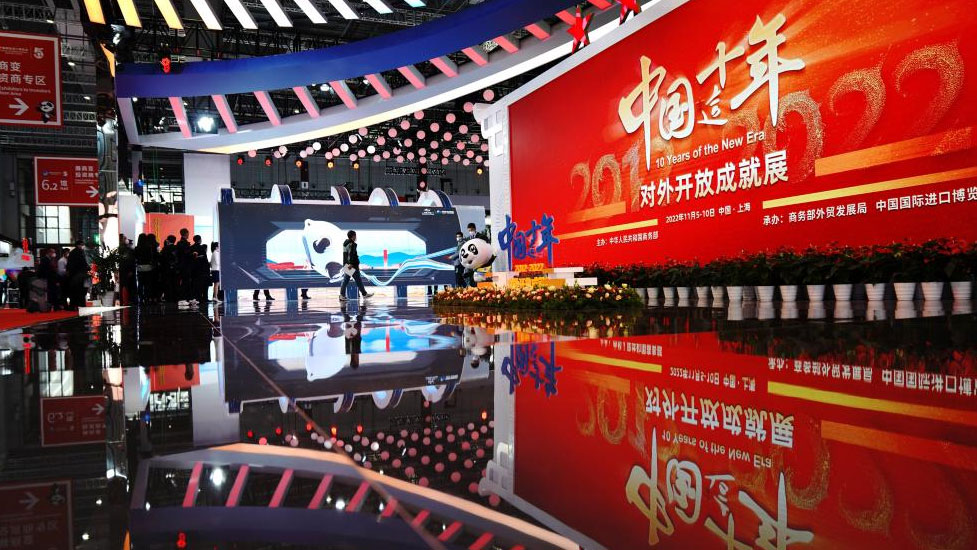A glimpse of how China's digital technology creates better life
HANGZHOU, Nov. 11 (Xinhua) -- At an expo of the 2022 World Internet Conference Wuzhen Summit, visitors lined up to have a try on a smart piano. Beginners can play a complete song much more easily with the help of its embedded LED indicator lights, artificial intelligence for intonation recognition and learning software.
"By creating the product, we are determined to lower the consumption threshold of the piano, simplify learning, and help everyone learn to play musical instruments in a better way," said Ye Bin, CEO of the ONE music group, which created the piano.
Addressing the problems of insufficient professional piano teachers and low teaching efficiency, the company also provides services of building offline classrooms installed with smart pianos and artificial intelligence teaching systems.
So far, more than 3,500 schools and training institutions in China have used the company's piano classroom services, and there are over 5,000 such classrooms in and outside of China.
Like the ONE music group, innovators in various fields have demonstrated their products and services at the summit held from Nov. 9 to 11 in the river town of Wuzhen in east China's Zhejiang Province.
Multiple breakthroughs have been displayed at the summit, ranging from smart charging piles and input devices controlled by eye movement to visual reality games and intelligent homes and communities, offering a glimpse of how digital technologies could help people live easier and happier lives.
The demonstration of application scenarios for digital projects at the summit has offered a broader view of the benefits brought by technology in daily life.
Besides education, digital technology has been applied in elderly care, a field with pressing demand in society.
In Tongxiang, east China's Zhejiang Province, smart products and services have made the lives of senior citizens safer, easier and healthier.
Assisted with service machines at local community centers, the elderly can order meals online and pay through face recognition. They can also have a quick heart and breath check by sitting on an intelligent chair.
While at home, smart devices such as bracelets and gas and smoke detectors are also available to oversee their health conditions and detect safety risks.
"China has a sound environment for innovation in the internet industry, and competition in the field is very fierce," said Alfonso Araujo, president of the Mexico-China Center. "It is impressive that Chinese people have many creative ideas and can adapt to new concepts and development quickly."
In the field of cultural exchange, the application of digital technology has also played a role.
For instance, through the internet, visitors can view high-definition images and make a panoramic roaming tour of multiple grottos of the Mogao Grottoes, a UNESCO World Heritage site in northwestern China.
So far, users from 78 countries, including China, the United States, the United Kingdom, Japan, Italy, Russia, Canada and France, have made such virtual tours more than 16.8 million times, Su Bomin, director of the Dunhuang Academy, said at the summit.
Another eye-catching product is China's BeiDou Navigation Satellite System, which has provided services in more than half of the countries and regions globally.
Used in more than 30 countries in Africa, the system has offered support for agricultural production, helped shorten the time for hospital building, and facilitated expressway construction.
In Asia, it has assisted projects in various fields including dam management, crude oil transportation, freight train operation, wildlife protection and urban governance.
"With the system put to use, life is becoming safer and more convenient for many more people," said Ran Chengqi, director of the China Satellite Navigation Office.
Photos
Related Stories
- Digital technology sweetens lychee business in south China
- Digital technology turns century-old Chinese grottoes vibrant
- Digital technologies provide subway passengers with better travel convenience
- Air travel in China will get smarter as roadmap planned out
- China approves plan to digitalize government services
- Digital technologies fair featuring China opens in Istanbul
- More Chinese seniors becoming internet-savvy
- Digital technologies help with medical treatment in China
- Beijing to accelerate digital technology innovation
- China energizes rural development with digital technologies
Copyright © 2022 People's Daily Online. All Rights Reserved.









